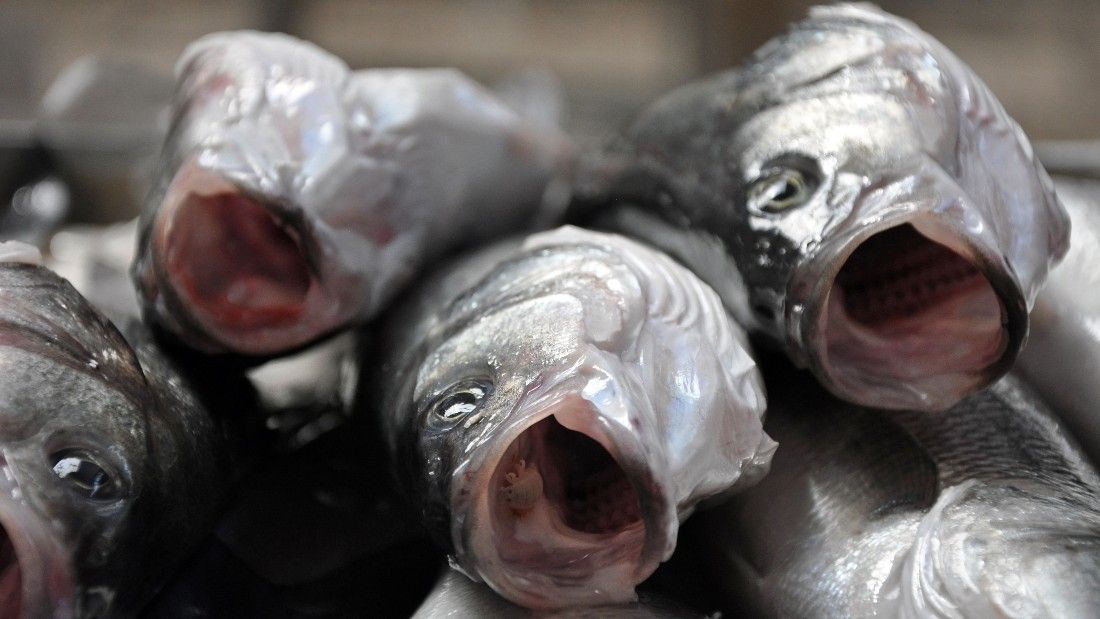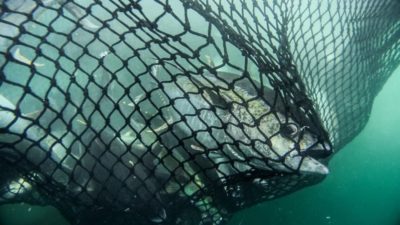5 Reasons Why Fish is Not a Health Food

Some people who stop eating meat continue eating fish in the belief that it’s good for them and that fishing is less cruel and less destructive than farming. Nothing could be further from the truth.
1. Fish oil salesmen
The most common health misconception is that fish is the best source of omega-3s. We need these essential fatty acids for our cell membranes, brain and nervous system. They help regulate blood pressure, blood-clotting, immune and inflammatory responses and are called ‘essential’ because we can’t make them in our bodies, we must get them from food.
ALA is an omega-3 essential fatty acid found in plant foods such as flaxseeds, chia seeds and walnuts. Our bodies convert it into the longer-chain omega-3s EPA and DHA. Conversion rates in the body can be low, especially if we consume a lot of food high in omega-6s (such as processed foods and vegetable oils). This is why some people insist that fish oils are essential for health – they are not.
Just like us, fish don’t produce their own omega-3, they get it from the algae in their diet – and we can do exactly the same. Studies have proven that algae supplements are just as effective as eating fish or taking fish oil supplements. Furthermore, as the algae is grown in hygienic, controlled conditions, there is no risk of accidentally dosing up on environmental toxins and pollutants found in fish. So, if you consume fish for the omega 3s, you’re better off swapping it for an algae-based option. You can get yours in the Viva! Shop.
2. Eating plants is better for your heart
We have been told that the omega-3s in fish are good for our heart, but a 2018 Cochrane review (recognised internationally as the gold standard for high-quality, trusted information) found that increasing EPA and DHA from oily fish or fish oil supplements had little or no effect on heart health. These findings are consistent with many other high‐quality studies.
On the other hand, they found that ALA from plant foods may slightly reduce the risk of cardiovascular events and arrhythmia (abnormal heart rhythm). Another 2018 review found that higher ALA intakes from plant foods were linked to a reduced risk of heart disease.
So it seems we’re better off with plant-based omega-3s. In fact, over the past two decades, many studies have shown a similar lack of effect from fish oils and a beneficial effect from consuming ALA directly from plant foods.
3. Omega-3 with a side of mercury
All the world’s oceans are contaminated with toxic pollutants such as methylmercury, polychlorinated biphenyls and dioxins, and many act as damaging neurotoxins. The highly toxic mercury becomes concentrated in the bodies of fish and shellfish, which is harmful to us because of its ability to damage our central nervous system. Fish is touted as a brain food but the truth is our grey matter would be better off without it.
We’ve already seen that the omega-3 in fish has little or no effect on heart health, but the mercury found in their flesh could actually damage our heart. A study of men in Eastern Finland, where mercury levels in fish are high, found that the level of mercury in their hair and the amount of fish they ate were linked to an increased risk of cardiovascular death. The American Heart Association says this might be explained by the damaging effects of the methylmercury found in fish.
4. Shellfish aren’t safe
Pollutants like mercury are not the only problem. Filter-feeding shellfish, such as mussels and oysters, can accumulate bacteria and viruses from their environment and when eaten raw, can pose a direct threat to health.
Norovirus is one of them and can cause fever, nausea, vomiting, cramping and diarrhoea. Many outbreaks are linked to shellfish contaminated by human faecal sources. Contamination of bivalve shellfish, particularly oysters, with norovirus is recognised as a food safety risk, one study found 69 per cent of 630 oyster samples ordered from vendors across the UK were found to be contaminated with norovirus.
5. Don’t fall foul of farmed fish
Fish farms now provide more than half of all fish consumed by humans but are certainly not the answer. These overcrowded, unnatural pens transmit disease and cause water pollution; choking marine life with persistent organic pollutants, antibiotics, chemicals from parasitical treatments, anaesthetics, disinfectants, feed additives, metals and antifoulants.
Viva!’s recent investigation into Scottish salmon revealed that the fish were riddled with parasitic, flesh-eating sea lice. Last time I checked, lice didn’t form part of a healthy diet.
Farmed fish also tend to contain less omega-3s as they are fed omega-6-rich vegetable oils in addition to fishmeal and fish oils. Yes, fish are being pulled out of the sea in order to feed farmed fish and livestock!
So there you have it. Fish is not the health food it’s been made out to be. There is nothing from fish you can’t get from plant-based sources – except the toxins, pollutants and parasites! And we haven’t even mentioned the devastating impacts of overfishing on the environment or the suffering caused to billions of fish and aquatic animals every year – yes, fish DO feel pain.







